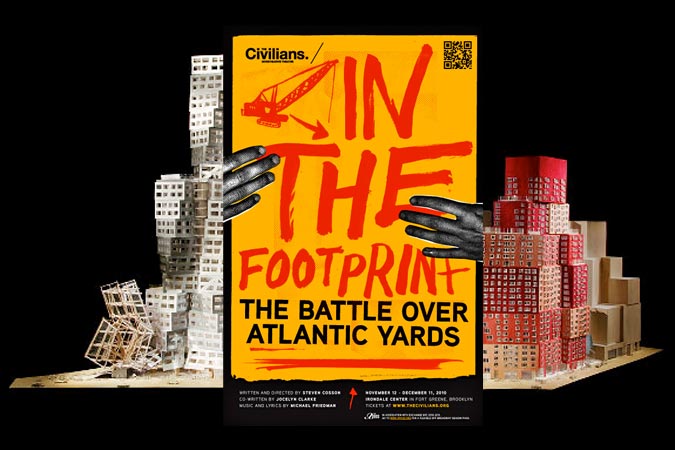
In the Footprint : The Battle over Atlantic Yards
Written by Steve Cosson
Irondale Theater, 85 S. Oxford Street. Brooklyn
Through December 11
The Civilians theater group performs In the Footprint: The Battle over Atlantic Yards in the Irondale Theater in the drafty, bare-boned auditorium of the Lafayette Avenue Presbyterian Church in Fort Greene, an old Sunday school space in a building from the 1860’s. It’s a world away from what’s proposed for 22 acres nearby.
On this stage, the Atlantic Yards Project is a stadium gambit imposed by a developer and his powerful allies that’s already displaced hundreds of people and won’t create many local jobs or affordable homes if it’s ever built. Written and directed by Steve Cosson, In the Footprint also faults local ministers, elected officials, and organizers as enablers of the project dividing potential local support that could have stopped it or at least made it more community-friendly.
In 90 minutes, it’s a distillation of the opponents’ side of the Atlantic Yards furor of a few months ago. The project is now in limbo with the New York State Supreme Court in connection with a November decision that the developer, Forest City Ratner tried to fast-track the environmental review process that however did not stay construction. There’s also doubt whether capital is available to make the deal sweet enough for Mikhail Prokhorov, the oligarch described as “Russia’s richest man” who now owns the New Jersey Nets. In the play, eminent domain to make way for private development is a lose-lose situation for locals—displacement whether the project goes up or not.
In the Footprint doesn’t give you all the facts, but it does pile on the emotions, as residents of the neighborhood where developers said “no one lived” scramble to save their homes from the 22-acre stadium project. Actors “costumed” in everyday clothes narrate the battle as outgunned powerless people who hope that organizing might wring some concessions from the rich and powerful. The tone turns earnestly fatalistic as the locals learn how rarely underdogs win those battles.
There’s a whimsically satirical edge to the grim lesson. Brooklyn borough president Marty Markowitz (the plan’s loudest booster) is a talking basketball held by an actor with the annoying habit of talking to himself much of the time. Frank Gehry, who signed on to the project in 2003 and parted company in 2009, is maligned as the designer of trophy monuments for developers and politicians. Local leaders who backed the project as an engine of economic growth are shown either as dupes, opportunists, traitors, or as Franken-folk combining all three elements.
Audiences who followed the dispute will be familiar with the play’s sentiments, but not with its dramatic architecture. Steve Cosson structures In the Footprint as a no-budget framework of available materials for his dozen energetic young performers (none looked over 30) who play characters speaking, singing, and shouting their lines, with Cosson as the sole accompanist on piano. The show advances briskly enough to avoid overkill by tears or speechmaking. If developer Bruce Ratner sees In the Footprint, he might leave wishing that his Atlantic Yards project were just as streamlined.
Inspirational sources for Cosson’s documentary drama might be the shoestring musicals of Elizabeth Swados (Runaways, 1978), which premiered after the city almost went bankrupt and when an East Village apartment cost $200 a month.
This activist drama unfolds when a studio in Brooklyn averages more than $2,000 a month. No surprise that questions from the audience tended toward the desperate “what can we do?” at a post-performance discussion with Cosson and Tom Angotti, professor of Urban Policy at Hunter College.
The audience left the creaky hall with a “wait til next time” anger that echoed the “wait til next year” chorus of loyal Brooklyn Dodger fans accustomed to watching their team lose. Let’s not forget that the beloved Dodgers decamped for a better financial deal in Los Angeles, and Ebbets Field was demolished. At least that stadium was leveled to make way for a housing project. In the Footprint laments that affordable housing in Atlantic Yards’ gentrified neighborhood seems an even longer shot than the Brooklyn Dodgers winning a World Series.